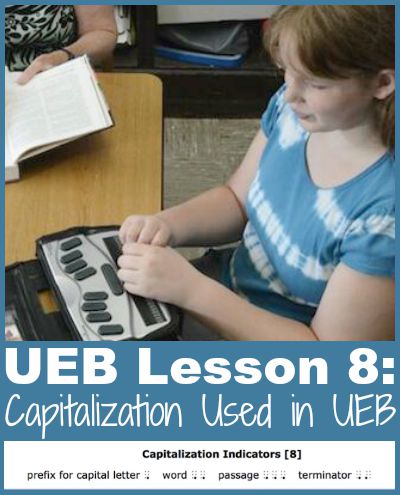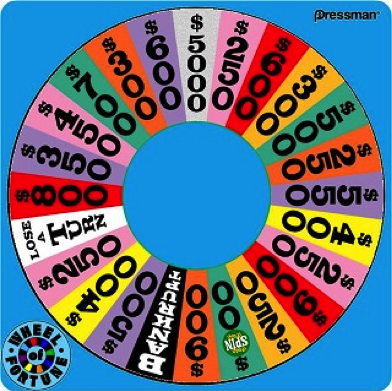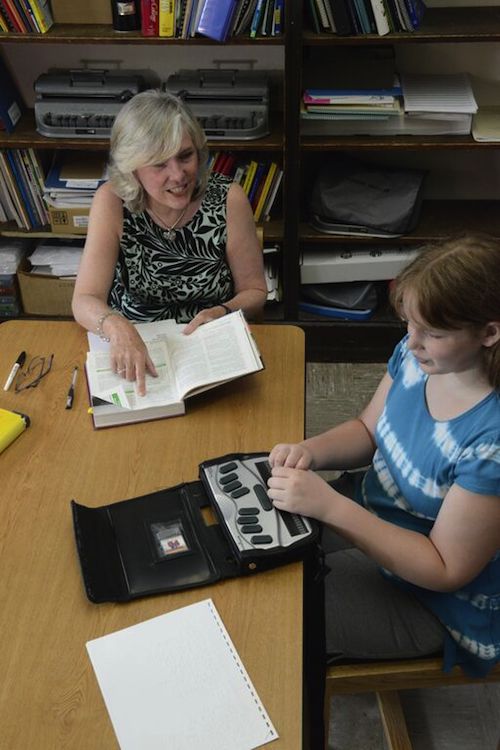UEB Lesson 8: Capitalization Used in UEB
Submitted by Catherine Summ on Sep 25, 2015

This post is the eighth in a series of lessons on teaching students who are braille readers to make the transition from EBAE (English Braille American Edition) to UEB (Unified English Braille). All lessons are by Catherine Summ and Suzanne Cappiello, who both work as Education Consultants for the Department of Rehabilitative Services (DORS-BESB) in CT.
See the full UEB Curriculum with all lessons.
Goal:
The student will be able to identify capitalization indicators that are now used in the UEB code.
A single capital letter is made the same way as in EBAE and in UEB. The capitalized word and passage indicators affect words and passages.
The capitalized word indicator is used if more than one capital letter appears in a word.
The capitalized passage indicator is used when a passage appears (a passage is three or more symbols-sequences). Also, capitalized passage mode can only end with the capitals terminator (dots 6, 3).
For further explanation of the changes refer to the handout “Overview of Changes from Current Literary Braille to Unified English Braille” authored by Braille Authority of North America, March 2013, www.brailleauthority.org. Refer to the UEB manual for a full explanation of the braille code.
Procedure:
Teacher prepares the examples below in braille. Students practice reading the examples below then mark the capitalization indicators used in UEB:
- LOOK and listen.
- CAN’T
- WON’T
- THEY’LL
- YOU’RE
- seaSHORE.org
- The sign says EXIT.
- We can purchase more DVD’s.
- His favorite movie is HARRY POTTER.
- She loves reading THE HUNGER GAMES.
Additional Activities: Writing Practice
Dictate the following words, phrases, and sentences to students indicating where the capitals appear. Add your own.
- DIDN’T
- SHE’LL
- Verizon WIREless
- The class is reading The Outsiders.
- His friend yelled, WATCH OUT FOR THAT BIKE!
Assessment:
Dictate the following words, phrases, and sentences to students indicating where the capitals appear. Add your own. Teacher compiles a spreadsheet for each student to document progress and compile data.
- UniFIED EngLISH BRAILLE
- STOP, DROP, and ROLL.
- WESTern Frontier
- www.VOTE.org
- Lobster ON Sale.
- The sign reads WATCH YOUR STEP.
- Her email shouted: TURN DOWN YOUR MUSIC!
- The CMA’s are on TV Sunday night.
- Dad said, HAVE A GOOD FLIGHT!
- I love to READ, READ, and READ!
Educational Activity and Game:
Wheel of Fortune

- Make a spinner with dollar amounts (i.e. $150, $350, $500, etc. based on your student's age and grade level).
- Vowels can be bought for $100 dollars.
- Make a “Lose Your Turn” spot on your spinner.
- Using index cards, braille 50+ cards with words, phrases, or short sentences using capitalization.
- Involve students in making the cards.
- This is the “draw” pile and can be placed near the spinner face down.
- Students use a braille writer to keep track of the letters in the word or phrase in the puzzle.
- The teacher decides on the puzzle word or phrase and then gives students the number of letters and words in the puzzle.
- The students will braille full cells for the letters and words on their paper.
- The first player picks from the “draw” deck and reads the card.
- If the player can explain the rule for capitalization then he may spin the spinner.
- If the player lands on a number then he/she can call out a letter to solve the puzzle.
- If the letter is in the word, tell the students where the letter appears in the word or phrase and have them record it on the paper below the full cells.
- If the letter does not appear, students can write these letters off to the side of the full cells. Have students record their scores (dollar amounts) on an abacus or by recording on another area of their paper.
- The first player to solve the puzzle wins.
Click here to download the handout in Word format.
Download the .dxb file. (Thank you to Karen Carl who created and shared this!)


